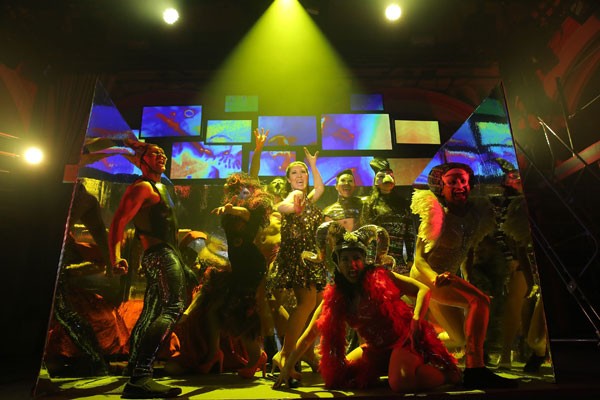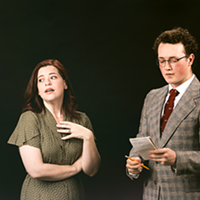Theater reviews: NY shows Here Lies Love, Cabaret, more
Hot summer tickets on Broadway and off-Broadway
By Perry TannenbaumSummer can be a fairly brutal time for theatre in New York. I'm not just talking about queuing up for discount tickets — for Broadway and off-Broadway shows — at the grand TKTS kiosk in Times Square and standing outside the theater, soaking in bonus UV rays long before the house is opened for seating.
Aside from these brutalities suffered by theatergoers out of loyal savvy enthusiasm or sheer stupidity, the summer season seriously imperils producers. Shows that are eyeing long open-ended runs on Broadway are no more likely to open during the summer months than they are in January.
Just before the Labor Day weekend, I sampled some fare of Summer 2014. Here's what I saw and how I saw it:
Here Lies Love (***1/2 out of 4) — Before Imelda Marcos became iconic for her vanity and her conspicuous consumption of shoes, it stands to reason that she was simply drop-dead gorgeous. That certainly checks out, for we find in this exhilarating musical version of her life that Imelda had a brief fling with Benigno Aquino, the chief political rival of the man she eventually married, president-to-be Ferdinand Marcos. Often compared to Jacqueline Kennedy when she was in her prime, Imelda was more than beautiful, according to the Wikipedia bio: relegated to second place in a Miss Manila beauty pageant, she contested the results and became Muse of Manila!
David Byrne and Fatboy Slim head the writing team that retunes Imelda's life to a disco beat, with a DJ narrator and a glossy songlist. Choosing among the conflicting accounts of his heroine's early life, Byrne opts for the version that depicts Imelda as a child of poverty in the outlying provinces, muddying the issue by having her deny her humble beginnings once she has risen to power. Byrne also invents a provincial childhood best friend, Dovie, whom Imelda disavows when she becomes First Lady. So in this castaway, we have a lingering cynical and disillusioned presence that speaks to us periodically, more pitiable than Ché in Evita but unquestionably in the same mold.
Despite its derivative qualities, I actually like Here Lies Love better. The repeated bludgeonings of Andrew Lloyd Weber's leitmotifs become burdensome. Tim Rice's book exhausts me with its unrelenting ambivalence, and his attempts at profundity are at times embarrassingly superficial and shallow.
Bringing the show to the third floor space at the Public Theater, director Alex Timbers turns Byrne's work into a disco whirl, with actors, stagehands, and audience constantly on the move — and on their feet. Even if you get balcony tickets, you must lean over the ledges to catch the action. As the actors and stagehands move the modular set around into different configurations, the audience below must go with the flow, and everything stops once or twice for the DJ to cue up a song while cast members teach us how to dance to it.
Being herded around and prompted is very relevant to the tide of events as the Marcoses win the favor of the people, consolidate their power, and grow more and more tyrannical. Cast as the electorate in this slick political theater environment, maybe feeling a thrill as the antiheroes mingle among us, we find that the slick superficiality of it all is very much on point. In a democracy whose shifts in power hinge on the 30-second soundbites pumped into our ears by PACS and plutocrats, we cannot feel as comfortably superior as we'd like to the primitive Filipinos.
Choreography by Annie-B Parson and projections on the surrounding four walls by Peter Nigrini amp up the orgiastic atmosphere to the brink of intoxication. Yet Ruthie Ann Miles is far more than a generic disco queen at the heart of it all. Before our eyes, she grows from a poor hopeful maiden into an old, cold imperialist, waspishly vindictive — with one soft spot in her heart for her old flame. Such complexity didn't prevent the audience from laughing out loud when the tyrant sang "Why Don't You Love Me?" to her people.
We don't get any more from Byrne about President Marcos than we did from Rice about Perón, but all the differentiations that Jose Llana makes between them are beautifully judged in his smoldering performance. Substituting for Conrad Ricamora on the night we attended, Vincent Rodriguez III's more extreme fervor as Aquino helped to underscore Marcos's cool control as a key to his success. Likewise, Renée Albulario wears her heart more softly on her sleeve as Imelda's childhood chum, the lodestar that shows us how far imperial First Lady has strayed. She and Kelvin Moon Loh, transformed from the DJ into a folksy troubadour, preside over a radical change in mood as all the gadgetry and gimmickry dissolve and they sing "God Draws Straight."
Not the conclusion I would draw. All evening long, Here Lies Love demonstrates that what is spoken isn't always as important as how it's said.
Cabaret (***1/2) — If you missed Alan Cumming as the Emcee of this Kander & Ebb gem in 1998, Roundabout Theatre has given you one of those truly precious second chances that life rarely affords. Even if you did catch the Tony Award-winning performance by one of our pre-eminent theatre greats in one of the supreme roles in our musical history, returning co-directors Sam Mendes and Rob Marshall have stirred things up sufficiently around Cumming to make this Kit Kat Klub experience noticeably different.
Pre-WW2 Berlin has grown more decadent. Last time at Studio 54, our narrator, Cliff Bradshaw, seemed to be teetering between a bisexual lifestyle and firmly closeting his outlawed inclinations to become a family man. With Bill Heck now in the role, Cliff's preferences have now tilted in the other direction, about 45 degrees toward gay. It's not Sally as much as her pregnancy that seems to be causing his wavering now. And with Michelle Williams making her Broadway debut as Sally Bowles, Cliff's roomie is noticeably less coy, flirty, or vivacious, and her fragility has veered toward stoned, fidgety neurosis.
To make matters worse, Williams' oddly slurred performance was often unintelligible. If you're a fan of Williams' film work, paying $207 at TKTS for a table in back is less wise than shelling out full price for a table up close.
Chemistry between Cliff and Sally has all but disappeared. Since Williams isn't a heavyweight champion belter when she delivers the climactic title song, the old-time balance between Sally and the Emcee when Liza Minnelli and Joel Gray filled the star-making roles has also, as Cumming famously stage-whispers, "vanished!" The show and the stage now belong almost entirely to Cumming.
And Cumming rides this star vehicle for all it's worth, exuding saturnine charm and confidence, lightly insulting the folk upstairs in the cheap seats, and presiding as a ghostly presence over many of the scenes where he should rightly be off in the wings. There is a little less wicked glee now in "Money" and "Two Ladies" than you'll find from Cumming on the old cast recording, but "I Don't Care Much" has grown more hopelessly dark and bleak, and it's delightful to see the rise "If You Could See Her" gets from a new generation when he delivers the devastating last line about his darling ape.
The darker shadings from our world-wearier Emcee also bring out the greater consequentiality of the doomed Herr Schultz-Fraulein Schneider romance compared with the Cliff-Sally dalliance and its tawdry resolution. Linda Emond takes a role that has often seemed sappy and given it a freshly poignant arc, moving from stolid pragmatism to autumnal hope to sullen resignation. Substituting for Danny Burstein, who was Tony-nominated alongside Emond, Philip Hoffman was wonderfully sweet as the cream in the Fraulein's coffee, and I found myself zoning in freshly to their love duets, especially "Married," with its nostalgic German lilt.
Of course, the musical contrast in tone between that ditty and the brutal march of "Tomorrow Belongs to Me" is ultimately at the very heart of Cabaret. Sadly, that juxtaposition returns to Studio 54 at a time when we're paradoxically closer to the scourge of Nazi Germany than we were in 1998. Anyone paying attention to the new outbreaks of anti-Semitism across Europe will certainly shudder at this potentially prophetic look backwards.
If/Then (**1/4) — Robert Frost had it right in "The Road Not Taken": "When two roads diverged in a nearby wood, he couldn't take both and remain one traveler." That commonplace of physics means nothing to writer Brian York and composer Tom Kitt in their new musical that brings Elizabeth Vaughan to New York to start a new life. On a sunny afternoon in Madison Square Park, she starts two new lives, one with a dreamboat boyfriend as Liz, the other as Beth in a high-powered dream job as a city planner.
Trouble is, the magical moment happens on a stage, without the simple double exposure you might expect in a Hollywood film showing two images of the same star heading off in different directions — or some razzle-dazzle body double special effect a more helpful writer-director team might have tried to pull off at the Richard Rodgers Theatre. No, you need to get the memo informing you that the moment of divergence occurs when Elizabeth doesn't answer her cell phone and when she does.
Otherwise, your understanding of what's going on afterwards is toast, and you're likely to feel like exclaiming "What the Fuck?" for altogether different reasons than Idina Menzel, alias Adele Dazeem. Blame physics for the misunderstanding: Elizabeth can't answer and not answer her cell simultaneously, so she must first do one and then the other in sequence. Have you ever seen someone answer a phone and, moments later, let it ring? Me too. So the cosmic moment comes off as an ordinary sequence of events to those who aren't in the know. From then on, Liz and Beth are delineated by a pair of glasses. Only Liz wears them.
At any moment, our lives can be forever changed by what seems to be the most innocuous decision: The plot of If/Then is York's whole point and vice versa. Let the power ballads begin!
Menzel hammers home York's point over and over, and if you think similar-themed songs might get monotonous, wait until you hear the stultifying cavalcade of American Idol-style showstopping that Menzel can inflict. Magnifying the annoyance is the fact that she's a pretty damn good actress when she gets back to York's remarkably tame book. With the merciful exception of the aforementioned "What the Fuck," sung at a moderately accelerated tempo (by both Liz and Beth), Menzel's grandstanding is not only a jarring interruption of the stories, it's basically the same interruption triple and quadruple-underlining the same idea.
When she finally begins "Always Starting Over" so very quietly (for her), you know it's because she's planning to scale higher pinnacles of volume, capped with her first sprinkling of real emotion. The instrument is magnificent, but she rarely coaxes any variety from it. Nor does anyone seem to want her to. Unlike the stars of a bygone age whose costumes personified their individuality and glitter, Menzel doesn't wear a single color for over two hours. The monochromatic green chic of Wicked has faded to gray and white, so that Liz and Beth stand out for their utter frumpiness. Miraculously, Menzel's adoring fans seem to feast on such homeliness.
Considering the humdrum stories they're trapped in, the supporting cast is actually quite appealing and vivacious. LaChanze as Elizabeth's gay best friend and Jerry Dixon as Beth's boss are outstanding. Yet everyone surrounding Liz and Beth must swim valiantly upstream, fighting the current of their wholesomeness — until the next tidal wave of Menzel washes them aside.
Speaking of...
-
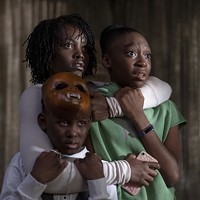
Double, double, toil and trouble
Mar 22, 2019 -
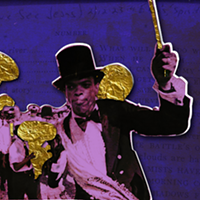
'God's Trombones' Brings Resounding Sermons to Spirit Square
Jun 13, 2018 -
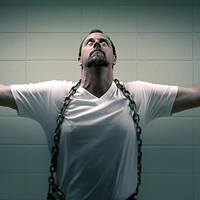
Shakespeare Carolina Delivers Spanish Gold in a Rat Pack Update
Apr 12, 2018 - More »
Latest in Theater
More by Perry Tannenbaum
Calendar
-

NEW WINDOW GALLERY-Pat Rhea-ACRYLIC PAINTINGS-April 05-30 2024 VALDESE, NC 28690 @ New Window Gallery/Play It Again Records
- Through April 30, 12 p.m.
-

WHISKEY TASTING: VIRGINIA HIGHLANDS WHISKY @ Elizabeth Parlour Room
-
An Evening With Phil Rosenthal Of "Somebody Feed Phil" @ Knight Theater
-
Kountry Wayne: The King Of Hearts Tour @ Ovens Auditorium
-

Trap & Paint + Karaoke @ Zodiac Bar & Grill
-
The joy and pain of comedian Oletha Cuevas 2
-
The ugly truth in Sociales: Débora Arango Arrives Today
Living in a country and a time that required women to keep their heads down and their mouths shut, this artist did neither.
-
Shaking it up in The Next Room, or The Vibrator Play 1

